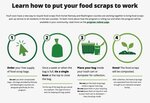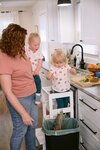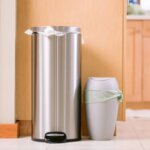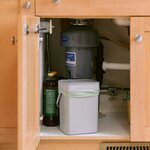By Cyrus Ruch and Patricia Ohmans, Frogtown Green
On a recent afternoon, Megan Maiers marched into Our Village, a community garden near her Frogtown home. In her hands was a small container filled with ordinary, leftover food scraps.
“If I didn’t garden, I don’t think I ever would have known of this place,” Megan said, after dumping the container full of vegetable peels, egg shells and other food residue into one of the garden’s large compost bins.
With a garden to tend to, Megan benefits from composting, as do her fellow gardeners. When the food scraps she puts in the bin decompose, the nutrient-laden soil that results will enrich her garden bed, where she grows tomatoes, beans and bright orange marigolds.
More than 20 percent of household garbage consists of food scraps, all of which could be composted instead of tossed in the trash. But if you’re not a gardener, why bother? If food scraps naturally decompose, what’s so bad about them going into a landfill?
The natural decomposition of organic material is hindered in a landfill, when the dirt used to cover the smell of garbage stops oxygen from getting to the food scraps. Without oxygen, these natural materials decompose anaerobically, releasing methane.
Methane is a hazardous air pollutant and greenhouse gas much more potent at warming than carbon dioxide. Methane has accounted for roughly 30 percent of global warming since pre-industrial times, according to the United Nations Environment Program. But composting food waste reduces methane emissions by more than half.
Although much of the methane produced in the U.S. comes from industrial agriculture, composting household organic waste is still a high priority in urban areas like St. Paul and Ramsey County. The county runs one long standing program at yard waste sites. Residents who don’t have a compost bin nearby can take food scraps to the same county-run sites where they bring yard waste and brush. Free compostable bags are also available at all the sites. To find the site nearest to you, check https://www.ramseycounty.us/residents/recycling-waste/collection-sites/yard-waste.
This year Ramsey/Washington Recycling and Energy has begun rolling out a new program, allowing residents to separate food scraps from other trash. Separated scraps are placed in sturdy but compostable bags, which can be put into the same bin as household garbage. After pickup, the compostables are sorted out at the Ramsey/Washington Recycling and Energy Center in Newport.
The program has already been implemented in Maplewood, Cottage Grove, Newport and North St. Paul. According to Annalee Garletz, Food Scrap Recycling Program Supervisor, the plan is to spread the program to the rest of Ramsey county over the next few years. Eventually, as much as 30,000 tons of waste could be composted instead of landfilled.
Interested in the program? Sign up on the Food scraps pickup program website (foodscrapspickup.com) for email updates on the rollout. You can also order compost bags free of charge there when your area becomes eligible. The phone number to call for more information is 651-661-9393.
Whether you are part of a local community garden with a compost bin, bring your food scraps to a yard waste collection site, or (eventually!) participate in the new curbside composting program, composting is a great way to reduce waste and fight climate change.
Frogtown Green is a resident-led and volunteer-powered environmental initiative in St Paul’s most diverse neighborhood. Frogtown Green intern Cyrus Ruch is a senior at Bethel University.







Comments
No comments on this item Please log in to comment by clicking here